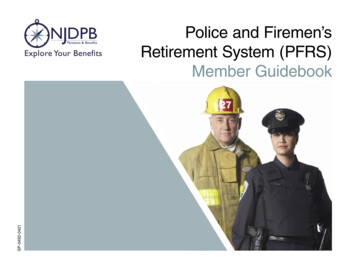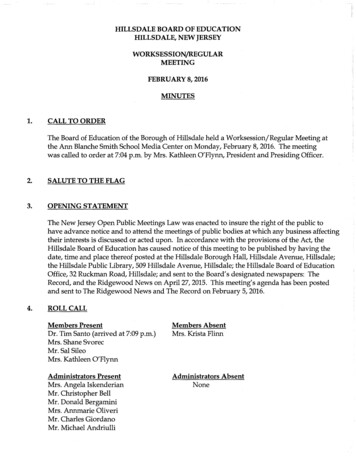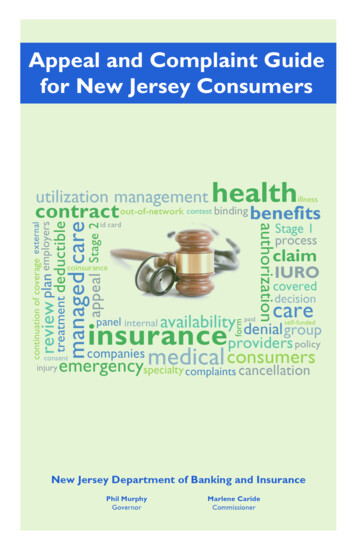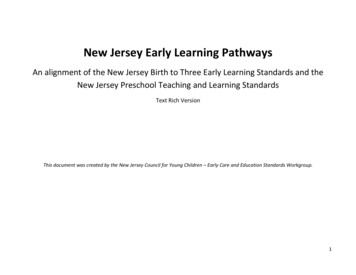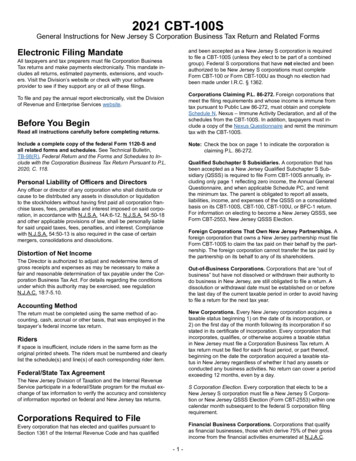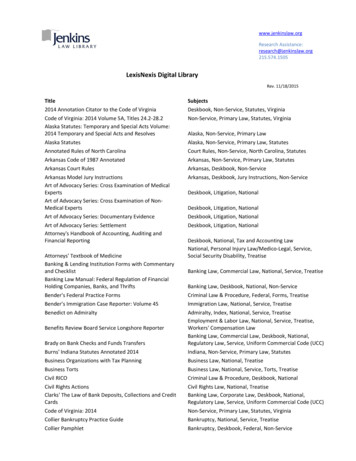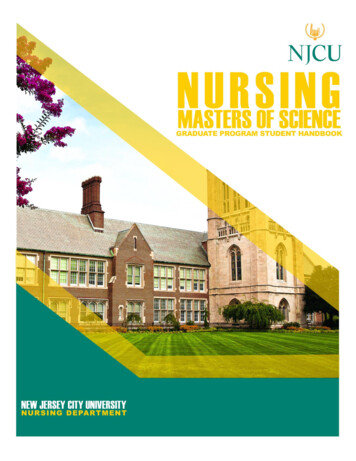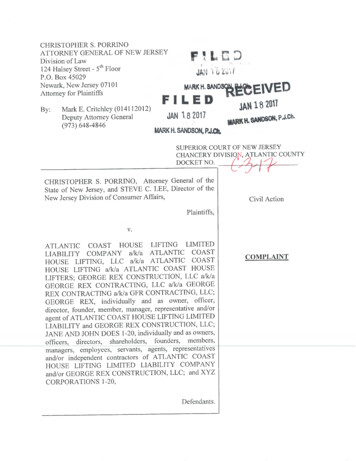
Transcription
Running Head: PROGRAM EVALUATIONProgram Evaluation of New Jersey City University, Accelerated BSN ProgramAdesola AdenijiN735: Educational Program Evaluation and AccreditationDuke University School of Nursing1
PROGRAM EVALUATION2Program DescriptionThe Nursing Department at the New Jersey City University (NJCU) was established in the year1976 to provide for the progression of diploma prepared registered nurses to baccalaureatedegree. Due to the increasing demand for baccalaureate prepared registered nurses, thedepartment established the Accelerated (fast-tracked) Bachelor of Science in Nursing (BSN)program in 1996 to prepare an alternate route for baccalaureate degree holders in otherdisciplines to transition to entry level registered nurses. The program provides innovativeeducational opportunities to non-nurse college graduates to transition into the nursing role within12 months. The curriculum reflects course objectives, content, and clinical learning that issimilar to those of a traditional four-year curriculum. The NJCU Accelerated BSN Program isaccredited by the Accrediting Commission for Education of Nursing (ACEN), formerly NationalLeague for Nursing Accrediting Commission (NLNAC), and the regional accrediting body, theMiddle States Commission on Higher Education of the Middle States Association of Collegesand Schools (NJCU, 2013). The NCLEX pass rate for the program as reported by the New JerseyBoard of Nursing (NJBON) is a 77% three pass rate average for first time test takers. Theaccelerated BSN program is offered on two campuses by the department (Jersey City-maincampus, and the satellite campus in Walls, NJ. A maximum number of 48 and 30 students areadmitted per cohort in the Jersey City and Wall respectively on annual basis (NJCU, 2013)Mission and Purpose of the Nursing DepartmentThe mission of the Nursing Department is to prepare highly competent professionalnurses to address complex human needs within a multicultural environment that will improve the
PROGRAM EVALUATION3health of individuals, families, and communities through the discovery and dissemination ofnursing knowledge and the translation of science into practice (NJCU, 2013).Faculty facilitates the education of students in the art and science of nursing to provideethical, holistic, culturally competent, evidence-based care in collaboration with other membersof the healthcare team in a variety of health care settings within a constantly evolving health careenvironment. Students, as members of the community in which they receive their education, arestakeholders in the health and welfare of the community they will serve (NJCU, 2013).The purpose of the program is to provide innovative opportunities to non-nursing collegegraduates to build on their previous undergraduate experience and transition into the nursingrole.Evaluation ModelFor the purpose of this study, the accreditation model has been chosen for evaluation ofthe NJCU accelerated BSN program. The accreditation model of evaluation like that offer byACEN and Commission on Collegiate Nursing Education (CCNE) assesses whether a programmeets prescribed qualities by an external agency (Gaberson & Vioral, 2014). The NJBONrecommended that all approval programs be accredited but the accreditation by an externalagency is mandated by the Board. However, for programs to be eligible for Title IV funding, anaccreditation by Department of Education approved agency is required. Accreditation by theseagencies is a “voluntary, self-regulatory process that promotes self-assessment and ongoingimprovement of educational programs” (Gaberson & Vioral, 2014).
PROGRAM EVALUATION4There are six standards ACEN required to be achieved by a program for accreditation.The standards are as depicted in the diagram below:Source: ACENBy submitting itself for accreditation, programs, through self-study and peer-review, ableto inform and earn the trust of the public that they minimum standards set by the accreditingbody and thus are of high quality.Dimension of the Program to be EvaluatedThe following are the dimension of the program that will be evaluated1. Mission Statement2. Faculty and Staff
PROGRAM EVALUATION53. StudentsEvaluation QuestionsThree questions that will be used to guide the evaluation of the program are:1. Are the mission and goals of the nursing program in congruence with the parentbody?2. Does the faculty possess the right credentialing, skills and competencies to achievestudent learning outcomes?3. Does the program achieve and maintain the minimum retention and graduateplacement rates?
Question 1: Are the mission and goals of the nursing program in congruence with the parent body?Evaluation AreaIndicatorsData Collection MethodologyTimelinePersonnel ResponsibleMission and GoalsProgram mission,goals/purpose andoutcomes are 95%congruent with thatof the University.Review of literature andpublications by parentUniversity and the program;Annually to ensurethat academic goalsare aligned tomissions of parentbody and the nursingdepartment mission.FacultyProgram mission,goals and outcomesare consistent withacceptableprofessionalpractice standardsand guidelinesProfessionalstandards andguidelines are100% consistentwith workforceneeds and carepracticesAlign programReview of parent Universityand departmental strategicplans;Review of nursing educationphilosophy;EvaluationCommittee meetingmay be calledbiannually.Review and compareprofessional standards,guidelines with the programstudents’ outcomes;Extensive reviewfive yearsStudent representativefrom each of thecampusesAdministrative SupportstaffDean of college.Representative fromstudent advisementReview NJBON RN Scope ofPractices and compared withprogram outcomes;Review and compared ACENminimum acceptable standardsto check for harmony betweenthe parent body mission andgoals, and program missionand goals;Surveys of stakeholders.Review of mission, goals andYearlyDean
PROGRAM EVALUATIONEvaluation Area7IndicatorsData Collection Methodologyoutcomes withmission andstrategic plan of theparent Universitystrategic plan alignment withthe program outcomes;InterviewsSurvey of students and alumniSurvey of stakeholdersTimelinePersonnel ResponsibleDepartmental chairAdministrative supportstaffFaculty
PROGRAM EVALUATION8Question 2: Does the faculty possess the right credentialing, skills and competencies to achieve student learning outcomes?Evaluation AreaIndicatorsData Collection MethodologyTimelinePersonnel ResponsibleFacultyFaculty possesses aminimum of MSNwith appropriatecredentialing inspecialty area ofnursing.Faculty are a mix ofideological trainingReview of faculty employeefileReview resumeReview of academicPublicationsReview of professional growthand developmentCredentialing verificationAt least 2 monthsprior to start of anacademic year.Human resourcesdepartmentNursing departmentAdministrative staffFacultyRatio of full-timefaculty to adjunctfacultyHead countReview of staff profileAnnuallyDeanDepartmental chairHuman resourcesFaculty/StudentsFaculty –studentratioAnnuallyFacultyMentors for newfaculty hiresReview of admission dataReview of enrollment dataFaculty censusInterviewsReview of employee filesSurveyDeanDepartmental chairHuman resourcesDeanDepartmental chairUnit HeadFacultyHuman resourcesEvery quarter and atthe end of eachsemester
PROGRAM ent985% of faculty willmake presentationsor publish researcharticles relevant tonursing at local,regional andnational levels95% of faculty willattend and/or makepresentationconferences,professionalworkshops, etc.100% of newfaculty will attendnew hire orientationprogramSurveysReview of publicationsAt the end of everyacademic yearFacultyDepartmental headDeanAdministrative mental headDeanAdministrative supportstaffNumber of attendance at newhire orientation workshop.SurveysAnnually80% of faculty willreceive grants andsponsorship forscholarshipactivitiesCongenial facultystudent relationshipNumber of grant applied forand won;AnnuallyDeanDepartmental headAdministrative supportstaffFacultyDeanDepartmental headFacultySurvey. An average score of 4on Likert scale of 1 to 5 onharmonious relationshipbetween faculty and studentsEvery semesterDepartmental chairSupport staffDean
PROGRAM EVALUATION10Question 3: Does the program achieve and maintain the minimum retention, completion and graduate placement rates?Evaluation AreaIndicatorsData Collection MethodologyTimelinePersonnel ResponsibleStudentStudent attritionrate of 30% or lessin the last threeyearsReview of graduation statisticsReview of program self-studysubmitted for accreditation;Cohorts admission recordsCohort graduation recordsAnnuallyDeanDepartmental chairFacultyAdministrative SupportstaffStudentProgramcompletion rate ofminimum of 85% inthe last three yearsReview of graduation statisticsReview of program self-studysubmitted for accreditation;Cohorts admission recordsCohort graduation recordsYearlyDeanDepartmental chairfacultyAdministrative SupportstaffStudentGraduate NCLEXpass rate of 75% atthe minimumReview of National Council of AnnuallyBoards of Nursing, New JerseyBoard of Nursing ProgramNCLEX Pass RateDepartmental (college) SelfStudyDeanDepartmental chairfacultyAdministrative Supportstaff
PROGRAM EVALUATIONStudent80% of graduatesare employed inpositions utilizingthe skills andcompetenciesacquired fromprogram trainingwithin 3 monthspost-graduation11Survey of graduatesInterviewsSelf-study report reviewEmployersBiannuallyDeanDepartmental chairAdministrative staffAlumni AssociationReview of recordsInterviewsSurvey of patrons of thecareer/placement centerserviceAnnuallyDeanDepartmental chairAdministrative supportstaffCareer center staffDirector of placement95% of graduatesare employed inpositions utilizingthe skills andcompetenciesacquired fromprogram trainingwithin 3 monthspost-graduationwithin six monthsof graduation.ResourcesCareer/placementcenter is able toassist 95% ofgraduates whoseeks assistancewith placement
ReferencesGaberson, K. B. & Vioral, A. N. (2014). Program assessment. In Oermann, M. H. & Gaberson,K. B. (eds). Evaluation and testing in nursing education (365-387. New York, NY:Springer Publishing Company.New Jersey City University (2013). New Jersey City University Accelerated BSN StudentHandbook 2013 – 2014. Retrieved from: http://www.njcu.edu/nursing/forms-anddocuments/New Jersey City University (2011). New Jersey City University 2011-2014 undergraduatecatalogue. Retrieved on from: http://www.njcu.edu/academics/pdf/ugcatalog.pdfNew Jersey Board of Nursing (n.d.). Program information: NCLEX RN program report.Retrieved from N.aspx
The NJCU Accelerated BSN Program is accredited by the Accrediting Commission for Education of Nursing (ACEN), formerly National League for Nursing Accrediting Commission (NLNAC), and the regional accrediting body, the Middle States Commission on Higher Education of the Middle States Association of Colleges and Schools (NJCU, 2013).
